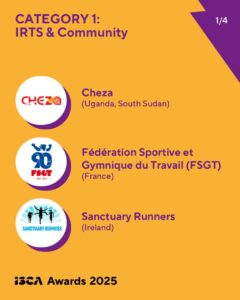Cheza Nominated for the ISCA Awards 2025 – Recognizing the Power of Play to Unite Communities
Copenhagen, Denmark, October 2025:
Cheza, a leading African sport-for-development organization that innovates around traditional African games, has been nominated for the ISCA Awards 2025 under the IRTS & Community category (Integration of Refugees Through Sport). The recognition celebrates Cheza’s exceptional work in using indigenous games such as Kwepena and BoruBoru as vehicles for inclusion, empowerment, and peace across refugee and host communities in East Africa.

A Nomination Rooted in Purpose
The International Sport and Culture Association (ISCA) Awards honor organizations worldwide that use sport and culture to promote positive social change. Being shortlisted under the IRTS & Community category marks a milestone for Cheza — acknowledging its decade-long mission to make traditional African games not only tools of cultural preservation but also instruments for community development, integration, and healing.
Founded in 2013, Cheza has evolved from a grassroots movement into a continental initiative using play to bridge divides, especially among vulnerable and displaced populations. Its work extends from Uganda to South Sudan, reaching children and youth affected by displacement, poverty, and gender inequality.
“This nomination is a reflection of Africa’s power to transform its heritage into hope,” says Simon Peter Tumukunde, Founder and President of Cheza. “Through indigenous games, we are creating safe spaces where refugees, host communities, and young people can play, learn, and grow together.”
Integrating Refugees Through Play
Central to Cheza’s nomination are two of its most impactful programs — BoruBoru Championing Girls and Kwepena for Financial Literacy.
BoruBoru Championing Girls, implemented in partnership with Help a Child Foundation, engages girls and young women in refugee and resettlement communities across South Sudan through sport. By reimagining BoruBoru — a traditional African throwing-and-dodging game — Cheza creates platforms for participants to gain confidence, leadership, and awareness about girls’ rights, gender equality, and education. The program not only offers recreation but also promotes dignity, safety, and empowerment for young women in challenging environments.
Meanwhile, Kwepena for Financial Literacy, run in partnership with FinMango and iProfile Foundation, creatively teaches financial management concepts through the game of Kwepena. Each play activity represents lessons in saving, investment, teamwork, and decision-making — translating sport into a living classroom. The initiative has engaged youth across Uganda, helping them develop skills to manage resources, build confidence, and foster entrepreneurship.
Together, these programs embody Cheza’s belief that play can be a language of inclusion — transcending cultural, social, and national barriers.
Building Bridges Through Traditional African Games
Cheza’s model goes beyond traditional sports development. It uses cultural games as community bridges, blending education, mental health awareness, and social innovation. The organization has also incorporated adaptive play to engage children with disabilities, ensuring no one is left out of the joy and value of sport.
By rebranding indigenous games like Kwepena (Uganda), BoruBoru (South Sudan), Sonko, Bladda, Omweso, Duulu, and Amahiri, Cheza is positioning African culture within the global sport-for-development ecosystem. Each game becomes a story of identity, resilience, and connection, offering both recreation and a pathway to empowerment.
“Our work proves that sport doesn’t have to come from outside Africa to make a difference,” Tumukunde adds. “The games we’ve always known, those we played barefoot in villages — are powerful enough to teach, heal, and unite the world.”
From Grassroots to Global Recognition
The ISCA Awards 2025, hosted during the MOVE Congress in Copenhagen, celebrate organizations that transform lives through sport and culture. Cheza’s nomination puts it alongside distinguished international initiatives from France and Ireland, recognizing its distinct contribution from Africa to the global conversation on inclusion and community development.
Cheza’s participation at the Global IRTS Forum will also provide a platform to share African perspectives on sport, displacement, and resilience, amplifying voices from communities that use play as a survival strategy and a tool for hope.
Looking Ahead: Play as a Pathway for Peace
This recognition energizes Cheza’s broader mission to scale its programs and expand partnerships across Africa. With representation in Kenya, Rwanda, South Sudan, Ghana, Côte d’Ivoire, and the Democratic Republic of Congo, and a growing partnership with the World Dodgeball Federation, Cheza continues to innovate around traditional games like ChezaDodge the modern evolution of Kwepena and BoruBoru.
As the organization prepares for upcoming events such as the African Dodgeball Cup in Abidjan and the ChezaDodge x Dodgeball East African Championships in Kigali, its commitment remains clear to elevate Africa’s traditional games into a new era of social impact, inclusion, and professional sport.
About Cheza
Cheza is an African social innovation and sport-for-development organization that adds value and innovation to traditional African games. Through its programs, research, and partnerships, Cheza leverages indigenous play to promote community integration, gender equality, health, and cultural identity.
Its vision is simple yet powerful: To revive and innovate traditional African sports as tools for unity, empowerment, and development.
A Nomination That Belongs to Africa
Cheza’s nomination for the ISCA Awards 2025 (IRTS & Community) is not only an organizational milestone, it’s a celebration of Africa’s resilience, creativity, and cultural wealth. It highlights the belief that play is not just entertainment, but empowerment; not just movement, but meaning.
As the world gathers in Copenhagen for the MOVE Congress and Global IRTS Awards, Cheza stands proudly as a symbol of what is possible when Africa plays its way to progress.
